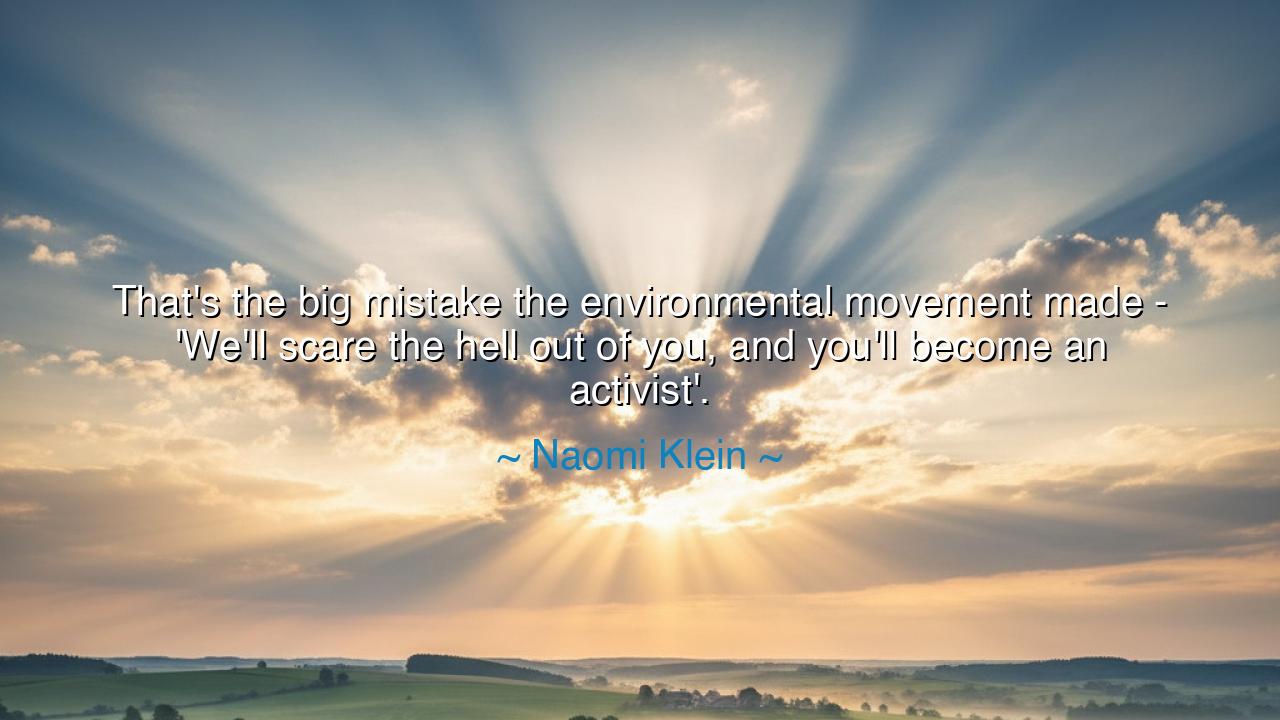
That's the big mistake the environmental movement made - 'We'll
That's the big mistake the environmental movement made - 'We'll scare the hell out of you, and you'll become an activist'.






The words of Naomi Klein—“That's the big mistake the environmental movement made — ‘We'll scare the hell out of you, and you'll become an activist.’”—are not merely criticism, but a revelation born of deep reflection upon human nature. Klein, a thinker and truth-teller of our age, speaks here of the failure of fear—the illusion that terror alone can awaken courage, or that despair can give birth to change. Her insight pierces to the heart of modern activism: that while fear can rattle the mind, it cannot sustain the soul. The movement to save the Earth, she tells us, must not be built upon anxiety, but upon love, vision, and belonging. For the frightened man may flee the fire, but only the inspired man will rebuild the home.
The origin of this quote arises from Klein’s long engagement with climate politics and social movements. As the author of This Changes Everything and On Fire, she has spent decades studying why people resist action in the face of planetary peril. She observed that environmentalists, in their urgency, often wielded fear as their chief weapon—showing melting glaciers, burning forests, and dying oceans to shock humanity awake. But Klein saw that this approach, though righteous in intent, often led to paralysis rather than participation. Fear without empowerment breeds hopelessness, not action. Her words are thus not a rejection of truth, but a call for a deeper kind of truth—one that restores faith in our capacity to act.
The ancients, too, understood this balance between fear and purpose. The philosopher Aristotle taught that courage lies not in the absence of fear, but in mastering it through moral clarity. The Hebrew prophets spoke of repentance not through terror, but through vision—by calling their people to remember their covenant with the divine and the earth. Even in Buddhism, the path to enlightenment begins not with dread of suffering, but with compassion for all living beings. Klein stands within this lineage of wisdom: she reminds us that while the sight of destruction can open our eyes, only love for what is sacred can move our hands.
History bears witness to the power of this truth. Consider the movement led by Wangari Maathai in Kenya, the founder of the Green Belt Movement. She did not frighten her people with images of desolation, though the land was indeed stripped bare. Instead, she spoke of hope—of trees returning, of shade and rain, of the beauty of renewal. Her movement began with a single seed planted by the hands of ordinary women, and it grew into a force that transformed nations. She taught that healing the earth is an act of faith, not fear, and in her gentleness, she accomplished what warnings alone could not.
Klein’s insight reveals a deeper understanding of human psychology. When people are told that the world is doomed, they often retreat into denial or distraction; the heart, overwhelmed, shuts its doors. But when they are shown that another world is possible—when they are invited to imagine a future worth fighting for—the same fear turns into fire, the same despair into determination. This is the alchemy of hope: it does not ignore the darkness, but transforms it into light. The environmental movement, she says, must learn this art anew—to replace apocalyptic despair with communal purpose, to remind humanity not only what it stands against, but what it stands for.
In her words lies a profound moral instruction: do not preach through terror, but through tenderness. To awaken others, we must speak to their love, not their dread—to their longing for home, for justice, for beauty. The ancient poets knew this secret well. When Homer sang of war, he did not linger on the horror of death, but on the valor of endurance, the ache of humanity’s longing for peace. So too must we speak of the Earth—not as a dying patient, but as a beloved mother, wounded but still alive, still capable of renewal through her children’s care.
Thus, the lesson of Naomi Klein’s words is both gentle and fierce: fear awakens the mind, but love awakens the will. The world does not need more terrified witnesses—it needs courageous gardeners, builders, and dreamers. To heal the planet, we must first heal the way we inspire. Let us teach through example, through shared purpose, through acts of creation rather than despair. For though fear may start a movement, only hope can sustain it. The heart that loves the Earth will defend it, not because it fears its loss, but because it cannot bear to live without its song.
And so, let us remember: the future will not be built by those who tremble, but by those who believe. The Earth is not saved by panic—it is saved by passion, by faith in our capacity to change. This is the wisdom of Naomi Klein’s reflection: that if we wish to save the world, we must fall in love with it again. Only then will we find the strength to rise, not out of fear, but out of the fierce and sacred joy of belonging to this living, fragile, and magnificent world.






AAdministratorAdministrator
Welcome, honored guests. Please leave a comment, we will respond soon